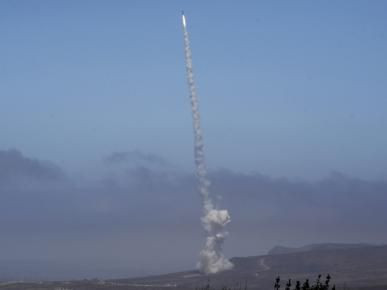U.S. Missile Defense System Hits Target In Key Test -Sources

WASHINGTON (Reuters) - The U.S. missile defense system managed by Boeing Co. Sunday hit a simulated enemy missile over the Pacific in the first successful intercept test of the program since 2008, sources briefed on the test results said.
The successful interception will help validate the troubled Boeing-run Ground-based Midcourse Defense (GMD) system which provides the sole U.S. defense against long-range ballistic missiles, and the Raytheon Co. kill vehicle that separates from the rocket and hits the incoming warhead, the sources said.
The system had failed to hit a dummy missile in five of eight tests since the Bush administration rushed to deploy the system in 2004 to counter growing threats by North Korea.
"The test was a success. The kill vehicle hit its target," said one of the sources, who was not authorized to speak publicly.
No further details were available about the test, in which an interceptor launched from Vandenberg Air Force Base in California hit a target used to simulate an intermediate-range missile that was launched from the Kwajalein Atoll in the Marshall Islands.
Sunday's test marked the first successful interception of the Raytheon Exoatmospheric Kill Vehicle Capability Enhancement II, or EKV CE-II, which failed in both previous tests conducted in 2010.
The Pentagon and companies involved had no immediate comment.
Missile Defense Agency Director Vice Admiral James Syring told lawmakers this month that another test failure would have forced the Pentagon to reassess its plans to add 14 more interceptors to the 30 already in silos in the ground in Alaska and California.
Ten of the interceptors now in place carry the kill vehicle used in Sunday's test. The other 20 carry an earlier kill vehicle that failed in a July 2013 test. Syring has said a fix will be implemented for that issue by year's end.
Riki Ellison, founder of the non-profit Missile Defense Advocacy Alliance, hailed the successful test as a big step forward for the troubled program, and said it would allow U.S. military commanders to reduce the number of interceptors that would be fired at an incoming ballistic missile.
"This success is a significant milestone ... that demonstrates the system's reliability and increases the confidence of the North American Combatant Commander ... responsible for the defense of the country," Ellison said in a statement.
© Copyright IBTimes 2024. All rights reserved.





















